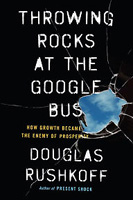
|
 |
Throwing Rocks at the Google Bus: How Growth Became the Enemy of Prosperity Douglas Rushkoff 
Format: Paperback, 304 pp. ISBN: 9780143131298 Publisher: Portfolio Publication Date: June 6, 2017 Average Customer Review: For Bulk Orders Call: 626-441-2024 Description and Reviews From The Publisher: Why doesn’t the explosive growth of companies like Facebook and Uber deliver more prosperity for everyone? What is the systemic problem that sets the rich against the poor and the technologists against everybody else? When protesters shattered the windows of a bus carrying Google employees to work, their anger may have been justifiable, but it was misdirected. The true conflict of our age isn’t between the unemployed and the digital elite, or even the 99 percent and the 1 percent. Rather, a tornado of technological improvements has spun our economic program out of control, and humanity as a whole—the pro-testers and the Google employees as well as the shareholders and the executives—are all trapped by the consequences. It’s time to optimize our economy for the human beings it’s supposed to be serving. In this groundbreaking book, acclaimed media scholar and author Douglas Rushkoff tells us how to combine the best of human nature with the best of modern technology. Tying together disparate threads—big data, the rise of robots and AI, the increasing participation of algorithms in stock market trading, the gig economy, the collapse of the eurozone—Rushkoff provides a critical vocabulary for our economic moment and a nuanced portrait of humans and commerce at a critical crossroads. > Reviews “Douglas Rushkoff is one of today’s most incisive media theorists and a provocative critic of our digital economy. He’s also fun to read.” —WALTER ISAACSON, president and CEO, The Aspen Institute, and author of The Innovators “If you don’t know Rushkoff, you’re not serious about figuring out what’s going to happen next.” SETH GODIN, author of Linchpin “Thoughtful, provocative, and essential reading for our economic moment.” —JOI ITO, director, MIT Media Lab “We’ve optimized for growth. But have we lost our way? As an economy? As a community? As a society with a value proposition that doesn’t make sense on a human or economic level? Rushkoff asks questions that matter. A challenging and necessary read.” —SHERRY TURKLE, author of Reclaiming Conversation “Every great advance begins when someone sees that what everyone else takes for granted may not actually be true. Douglas Rushkoff questions the deepest assumptions of the modern economy and blazes a path toward a more human-centered world.” —TIM O’REILLY, founder, O’Reilly Media “Douglas Rushkoff is a true digital visionary. Read this rousing call to reboot our society from the bottom up before it’s too late.” —ASTRA TAYLOR, filmmaker and author of The People’s Platform “In what could be seen as a crisis, Rushkoff shares his smart, optimistic, and pragmatic perspective about how both businesses and consumers can reimagine today’s current economic operating system in the digital age—and prosper.” —BONIN BOUGH, chief media and e-commerce officer, Mondelez
About the Author Douglas Rushkoff is the bestselling author of Present Shock, as well as a dozen other books on media, technology, and culture, including Program or Be Programmed and Life Inc. Named one of the world’s ten most influential thinkers by MIT, he has made documentaries for PBS Frontline, including Generation Like and The Merchants of Cool, and he is a professor of media theory and digital economics at Queens College, CUNY. He lives in New York and lectures about media, society, and economics around the world. Find Items On Similar Subjects |
|

The Essential Lists BOOKS TO READ BEFORE YOU LEAD 
Grow Your Leadership Skills NEW AND UPCOMING LEADERSHIP BOOKS 
Classic Leadership Books BOOKS TO READ BEFORE YOU LEAD |
 |
| ||
 | © 2020 LeadershipNow™ All materials contained in https://www.LeadershipNow.com are protected by copyright and trademark laws and may not be used for any purpose whatsoever other than private, non-commercial viewing purposes. Derivative works and other unauthorized copying or use of stills, video footage, text or graphics is expressly prohibited. |
||